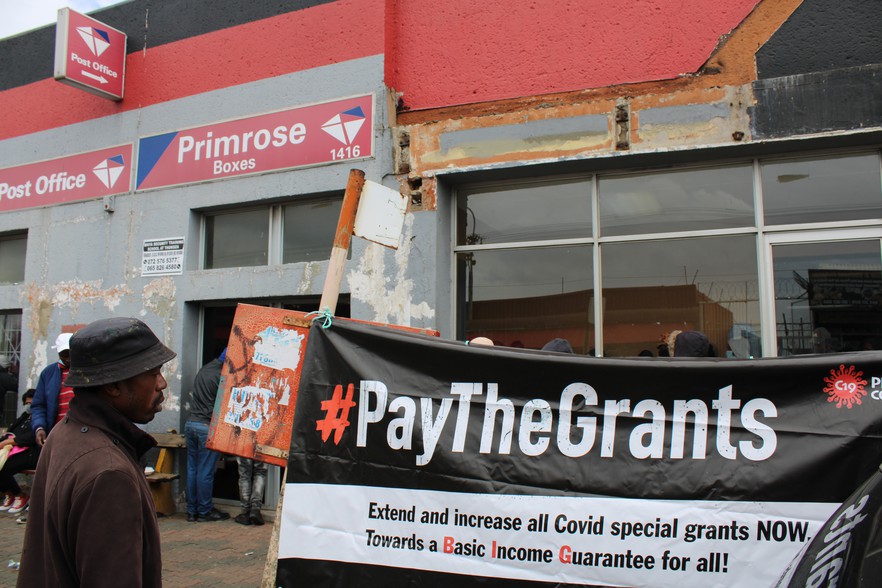Activists takes government to court over “unfair” R350 grant application rules
They say at least 10 million applicants are still waiting for their R350 Social Relief of Distress Grant payments since April
Civil society organisations are taking the ministers of Social Development and Finance, as well as the South African Social Security Agency to court over what they say are “unfair” and “exclusionary” regulations for the R350 Social Relief of Distress Grant. Archive photo: Masego Mafata
-
Civil society organisations are taking the government to court over what they say are “unfair” and “exclusionary” regulations for the R350 Social Relief of Distress Grant.
-
They want the current regulations declared unconstitutional and set aside.
-
They are also opposed to the “arbitrary means test” which excludes many vulnerable people who qualified for the grant previously. Under the new regulations, grant applicants are disqualified if they earn more than R350 a month.
-
The Institute for Economic Justice’s lawyers have also sent a letter of demand to the state to address, with urgency, concerns over the unpaid SRD grants since April to over 10 million applicants.
Civil society organisations are taking the ministers of Social Development and Finance, as well as the South African Social Security Agency (SASSA) to court over “unfair” and “exclusionary” regulations for the R350 Social Relief of Distress Grant. They want the current regulations declared unconstitutional and set aside.
In a media briefing on Thursday, the Black Sash, #PayTheGrants, Amandla.mobi, the Centre for Applied Legal Studies (CALS), the Institute for Economic Justice, and the Social Policy Initiative announced that they have filed an application against the government in the High Court in Pretoria.
Rachel Bukasa national director of the Black Sash said they will challenge unfair practices in cases where grants were not paid. They are also opposed to the “arbitrary means test” which has now excluded many vulnerable people who previously qualified for the grant. Under the new regulations, grant applicants are disqualified if they have an income into their bank account of more than R350 per month.
Bukasa said the new application process is littered with problems. One example, she said, is that people who also receive more than one grant, such as a mother getting paid a Child Support Grant on behalf of her child, are also being disqualified. “The launch of the litigation is a last resort to make the system more accessible,” she said.
Bukasa said that the new regulations are too restrictive. She said that civil society organisations have tried to discuss these issues with the government over the past few months to no avail.
She said that R350 is inadequate as the cost of food and other expenses are on the rise.
The activists also highlighted that many payments from April were still outstanding.
Neil Coleman from the Institute for Economic Justice said the country is facing a humanitarian crisis. He said IEJ’s lawyers sent a letter of demand that the state address, with urgency, concerns over the unpaid SRD grants since April to over 10 million applicants.
Francina Nkosi, who spoke on behalf of affected beneficiaries, said that the grant has helped people buy food, medication, and sanitary products for girls and women. “We’re not saying it’s enough but it’s better than nothing,” said Nkosi.
She said that the exclusion of thousands of beneficiaries has caused a lot of stress among people who have been relying on the grant as their sole means to survive.
GroundUp sent questions to the Department of Social Development and SASSA but a response was not received by the time of publication.
Support independent journalism
Donate using Payfast

Don't miss out on the latest news
We respect your privacy, and promise we won't spam you.
Next: Video: How an organisation is giving Cape Flats children balls not guns
Previous: Marikana families remain in the dark five years after landmark ruling
Letters
Dear Editor
Is the government even aware of this new rule of checking our bank account if we are receiving any other income more than the R350? If so then I suggest that they just keep their R350 for themselves since they want that because this simply means even we who receive child grants won't qualify. The government first said this money is for unemployment, not for people who receive less than R350 in their accounts. Stop coming up with new rules every month and eat your money if you don't want to pay unemployed people. Next thing you will want to check where we live so you can see if we deserve it or not!
© 2022 GroundUp. This article is licensed under a Creative Commons Attribution-NoDerivatives 4.0 International License.
You may republish this article, so long as you credit the authors and GroundUp, and do not change the text. Please include a link back to the original article.
We put an invisible pixel in the article so that we can count traffic to republishers. All analytics tools are solely on our servers. We do not give our logs to any third party. Logs are deleted after two weeks. We do not use any IP address identifying information except to count regional traffic. We are solely interested in counting hits, not tracking users. If you republish, please do not delete the invisible pixel.

